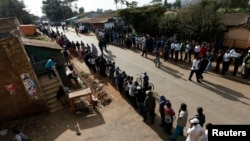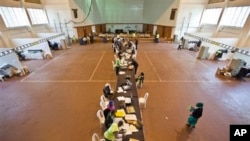Kenya is in the midst of a 90-day independent audit of the country’s voter list ahead of August elections. Experts say the review could see tens of thousands of names removed. Mohammed Yusuf has the story from Nairobi.
Earlier this year during a mass voter registration exercise, the electoral body expected to register six million Kenyans in one month. Political parties set a target of 10 million.
They all missed the mark. The drive saw 3.7 million people registered.
Samwel Ogola says people routinely overestimate the population in a given area. He should know. He is in charge of population statistics with the Kenya National Bureau of Statistics.
“It’s human if your expectation is not met, if you are feeling you are ten but you are told you are only eight, you may feel that’s not it, and that’s human nature," said Ogola. "But again we must learn to rely on facts, and figures don’t lie.”
Between March 2013 and March 2017, Kenya’s voter list grew by 5.3 million people. The list now stands at 19.6 million. That’s just under half of the total population of around 45 million. Opposition groups and some political observers have raised doubts, given the large proportion of Kenya’s population that is under the age of 18.
The Independent Electoral and Boundaries Commission assigned international auditing firm KPMG to the job of checking the list. With allegations of fraud already circulating since last year, a voter register, accepted as correct by all political parties, is seen as key to ensuring peaceful nationwide elections in August.
KPMG says it is using data from multiple sources, including recently issued identification cards and passports. In a recent press conference, Gerald Kasimu of KPMG said they would leave nothing to chance during the process.
“We will verify every single name in the register against third-party data… and it's important to emphasize the need for comparison against the register of national births and deaths for the purposes of ensuring any perceptions or misconceptions around the potential for underage voters being in the register or the potential of deceased voters being in the register is addressed," said Kasimu.
But some government records may be incomplete or out of date, says Peter Nyakwara of the National Council for Population and Development. The last census was done in 2009.
“The problem we are having in Africa and Kenya included, we have not invested in vital statistics, registration of deaths and births which should be continuous on a daily basis, so that we can have, at any minute you are able to know how many people have died today, how many have survived so that every month, every year we are able to know this is where the population is moving to," said Nyakwara.
KPMG is expected to hand over the updated voter register, as well as its findings and recommendations, to the electoral commission and the National Assembly next month.





